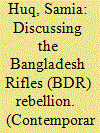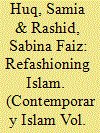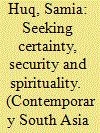|
|
|
Sort Order |
|
|
|
Items / Page
|
|
|
|
|
|
|
| Srl | Item |
| 1 |
ID:
106697


|
|
|
|
|
| Publication |
2011.
|
| Summary/Abstract |
This article explores the piety/politics nexus by asking what it means when educated, urban Bangladeshi women who are embracing religion anew claim that their pursuit of piety, and the learning circles that inspire it, are apolitical. I explain this self-proclaimed apolitical stance through women's own accounts of why and how they maintain political neutrality. The article demonstrates that organizers of many Islamic discussion circles in Dhaka consciously strive to attain a certain political neutrality, while allowing whoever is interested to attend, irrespective of the latter's political affinities. This decision stems from an understanding of the lack of trust that accompanies organized religion in Bangladesh, and its alliance, in the national imaginary, with the explicit political agenda of the Jama'at-i Islami. The article provides an account of different discussion circle members' varied articulation of political neutrality and how they draw from different ideas and discourses about being publicly religious in their molding of the ideal, pious, Bangladeshi woman. To exemplify the pious self-fashioning of urban, educated, Bangladeshi women, I will recount the ways in which several women discussed the March 2009 Bangladesh Rifles mutiny-a highly politically charged event. Women's accounts of the mutiny serve to unify lesson attendees around the cultivation of piety. Contestations over national politics and political affinities are made secondary, as women focus on giving an ethical bend to the deeply personal, subjective and gendered experiences of being educated and upwardly-mobile in present day urban Bangladesh.
|
|
|
|
|
|
|
|
|
|
|
|
|
|
|
|
| 2 |
ID:
081749


|
|
|
|
|
| Publication |
2008.
|
| Summary/Abstract |
This paper attempts to explore the development of Islamic identity of a group of elite women in Dhaka, Bangladesh. These women constitute a significant group in the country where 10% of the rich control 40% of the national wealth, and the 10% of the poorest control 1.84% of the national wealth.* Socially, politically and economically, elite women and their families are powerful and have access to resources and political influence. Many of these women who did not grow up with a very strict religious orientation came to Islam and consolidated religious thoughts and practices through a weekly Quran reading class. This particular Quran class began in 2002. The classes were initiated by a foreign diplomat's wife who was Muslim, and have continued even after her departure from the country in 2004. While Dhaka houses many meetings of Muslim men and women to discuss Islamic ideas and practices, this particular class was quite unique in its ability to attract and convert elite women whose lives were seemingly perfect. This urban elite phenomenon of Islamic revivalism has not been the subject of any in-depth research in Bangladesh, and this work therefore, is the first of its kind and largely introductory
|
|
|
|
|
|
|
|
|
|
|
|
|
|
|
|
| 3 |
ID:
180274


|
|
|
|
|
| Summary/Abstract |
Bangladesh has made significant strides on women’s issues in the areas of education, employment and politics. In the wake of this progress, the country has also experienced a surge of religious ideas leading to secular anxiety that cultural Islamization is leaving very tangible marks on the bodies and lives of women. The proliferation of the hijab along with an appropriation of other religio-cultural elements into everyday life is considered to be an example of the force of Islamization that many fear to be conducive to radicalization. In this paper, I probe the role of religion in the lives of female university students in an attempt to assess what it means for them to be young, to have aspirations, to navigate different and often opposing expectations, and to assert their agency as they stand on the cusp of adulthood. In teasing out the influences that give their lives’ navigations religious sanctions and/or approvals, I trace the place of inclusivity, pluralism and tolerance in the lives of young, educated women in Bangladesh.
|
|
|
|
|
|
|
|
|
|
|
|
|
|
|
|
|
|
|
|
|